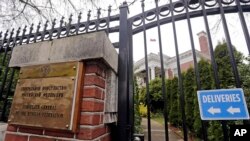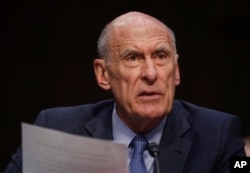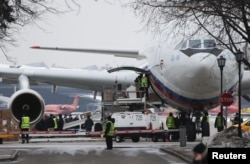The Trump administration is weighing further retaliation against Russia for meddling in the election and interfering in the affairs of the United States and its allies, the top U.S. intelligence official said Wednesday.
"This is under considerable consideration and more things will be done — and soon — above where we are right now," National Intelligence Director Dan Coats told reporters at a breakfast briefing. "I would just say stay tuned on that. I think we are becoming more and more aware of the potential for Russia to continue to engage in any number of ways relative to our elections and a lot of steps are being taken."
Russia has been accused of meddling in the 2016 presidential election and of being behind the March 4 nerve agent attack on ex-Russian spy Sergei Skripal and his daughter, Yulia, in the city of Salisbury, England.
The poisoning plunged relations between the West and Russia to their lowest ebb since the Cold War. More than two dozen Western allies expelled more than 150 Russian diplomats in a show of solidarity with Britain. Russia responded by ordering the same number of their envoys out.
Russia has denied being behind the nerve agent attack. In Moscow, Sergei Naryshkin, director of Russia's Foreign Intelligence Service, the top KGB successor agency, said the poisoning was a "grotesque provocation rudely staged by the British and U.S. intelligence agencies."
Naryshkin said the poisoning was the latest example of the U.S.-led efforts to undermine Russia, adding that the Russia-West chill is comparable to the Cold War.
Coats said the U.S. agrees with British Prime Minister Theresa May who said that Russia is the only nation state capable of using the nerve agent in such an attack.
"They [the Russians] either instituted it themselves or they lost control of it and somebody else did it. When you look at the history of it — the Russian malign activities and so forth — it's not hard to come to the conclusion that the Russians were out to send a signal to their other spies who have come out of the cold. Or [it was] just a continued power play by [Russian President Vladimir] Putin just prior to his election," Coats said.
Putin was pushing hard to get as many votes as possible in his re-election bid, so the attack might have been his way of "playing Mr. Strongman" and persuading voters into thinking his is the leader to bring Russia back into power after the fall of the Berlin Wall and the collapse of the USSR in the early 1990s.
He described Putin as "shrewd" and "calculating" and said when dealing with the former KGB officer, the U.S. needs to "go in with eyes wide open and with a high degree of skepticism."
Coats was asked why the U.S. decided to retaliate against Russia by closing its consulate in Seattle, which was near a submarine base, Naval Base Kitsap, as well as Boeing Co. operations.
The Russians didn't decide to open a consulate in Seattle because of "the climate or the nice living conditions," Coats said. "One could assume that they went there because there were [intelligence] collection opportunities."






